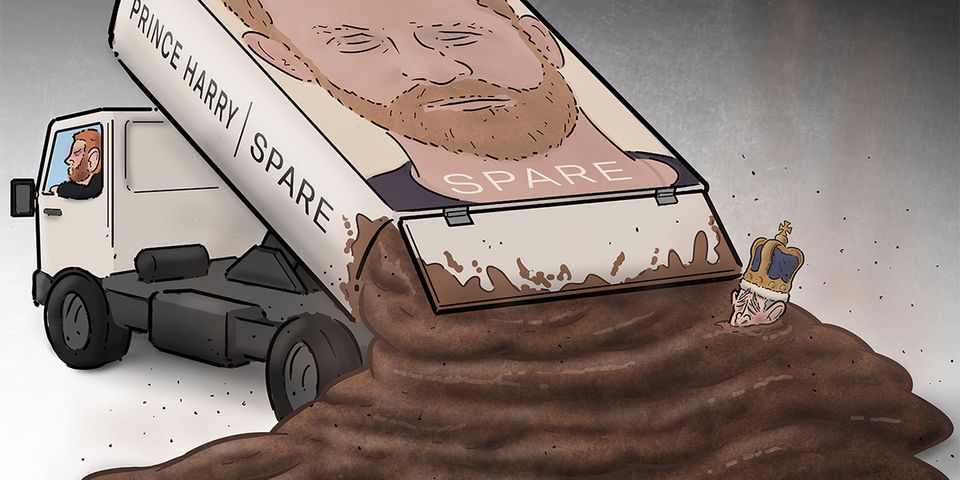Royal spares

1—Royal spares
Prince Harry's tell-all memoir – "Spare" – was released last week. If you missed the myriad articles that flooded our news feed, the TL;DR is that Harry was treated as a second class citizen in the House of Windsor:
"I was the shadow, the support, the Plan B. I was brought into the world in case something happened to Willy. I understood my role as a diversion and a distraction from my brother. Or to provide, if necessary, a spare part to him. Kidney, perhaps. Blood transfusion. Speck of bone marrow."
Poor guy. But he does raise an interesting question – namely, "the problem of royal brothers falling out". Ed West points out that Harry's life is far better than it would have been were he a "spare" in the former Ottoman Empire:
"When the old sultan died the strongest of his sons would simply take the throne, and then have the head gardener strangle all his half-brothers with a silken cord, with their bodies thrown off a cliff.
If this seems a bit cruel, the Ottomans feared the alternative — endless strife caused by excess brothers, who invariably rose in rebellion or went to foreign courts to become rallying points for discontent."
Genetics is a roll of the dice, and that's an issue for monarchies. West notes that Prince Philip (Harry's grandfather) was a highly intelligent man, while "Harry, in contrast, is described as not being 'the family scholar'."
"He grew up surrounded by inhuman press intrusion, family conflict and grief. And, like so many could-have-been kings or sultans, he has become a destabilising force for the ruling dynasty, a perhaps unwitting vector for the family's enemies — even while helping his mother's real tormentors, the press, who now follow his story around like crows eyeing a line of men going into battle."
Do read the full essay by West here (~9 minute read), which includes plenty more on the history of conflict within royal families and how Meghan and Harry compare.
2—AI and the tower of capabilities
"ChatGPT is a remarkable achievement in automating the doing of major human-like things", but that doesn't make it suitable to all tasks. According to Wolfram|Alpha:
"[O]ne of the great achievements of our civilization over the past several centuries has been to build up the paradigms of mathematics, the exact sciences—and, most importantly, now computation—and to create a tower of capabilities quite different from what pure human-like thinking can achieve."
For those out of the loop, Wolfram|Alpha is a competitor of ChatGPT in that it "answers factual queries by computing answers from externally sourced data", curated by humans. By contrast, ChatGPT:
"[I]s a system for generating linguistic output that 'follows the pattern' of what's out there on the web and in books and other materials that have been used in its training. And what's remarkable is how human-like the output is, not just at a small scale, but across whole essays. It has coherent things to say, that pull in concepts it's learned, quite often in interesting and unexpected ways. What it produces is always 'statistically plausible', at least at a linguistic level. But—impressive as that ends up being—it certainly doesn't mean that all the facts and computations it confidently trots out are necessarily correct."
ChatGPT is especially poor at answering math-related questions because it doesn't understand it, providing users with very plausible answers that happen to be very wrong.
There are lots of interesting examples in the full post (~12 minute read), although the solution provided (connecting ChatGPT to Wolfram|Alpha) won't actually solve any of the problems inherent to large language models.
3—Energy lessons from blueberries

4—Systematically overexposed
Rumours are swirling that the Chinese government plans to revive the local property market, a sector that has had a rough time from regulators ever since Xi Jinping said that "houses are for living in, not for speculation".
But according to Michael Pettis, "this may be harder than policymakers think":
"It wasn't an accident, or the result of misguided policy implementation, that the property sector contraction has been so painful. It was the consequence of how large parts of the Chinese economy had become systematically overexposed to the sector.
This was inevitable when economic agents – including developers, businesses, banks, households and local governments – had been encouraged over decades into directly and indirectly reinforcing the overextension of the sector. It is precisely why the eventual adjustment was always going to be far more difficult than regulators expected."
You can read Pettis' full essay here (~4 minute read), in which he warns that the adjustment will be painful because the banks, local governments, households and developers who bet on property over the past four decades did extremely well, causing an economic shift "in ways that become increasingly speculative and dependent on rising real estate prices".
5—Further reading...
🤖 "The worst thing about ChatGPT's close-but-no-cigar answer is not that it's wrong. It's that it seems so convincing. So convincing that it didn't even occur to the Tweeter to doubt it."
💸 Bigger deficits for years to come (the RBA also made this mistake): "The Fed's remittances would have exceeded $100 billion per year throughout the coming decade if QE4 had not been conducted."
👩⚖️ "If the highest court in India can double as a moot court, debating a policy that invalidated 86% of the currency in circulation through a surprise telecast without any constitutional remedy, it will surely repeat it for lesser cases."
🏴☠ "[T]he more I've seen SBF try to make his case, the less sympathetic I've gotten. Because the fundamental question is pretty simple: Did he allow Alameda to borrow billions of dollars from FTX without customer consent? At this point, almost everyone thinks the answer is 'yes.' And while he's been far more talkative than most criminal defendants, he hasn't offered anyone a good reason to change their minds."